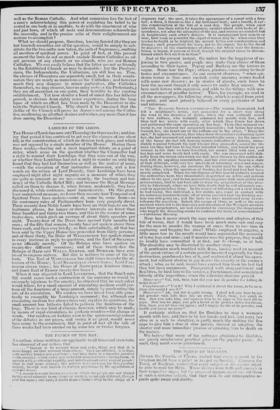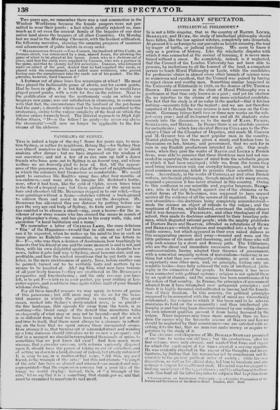THE MARCH OF MANNER.S.
kingdom might have a indict in It is pit on Simday. (-Iaoana the Third, of England, wished that (2\ ery sulje(..4 of his crriwn might be able to read I he Bible. These desire.; were both well enough in their respective days: but the mai improvoment has left them at such a distance Lehind, that they look to our retrospective re- gards quite mean and shabby,
Two years ago, we remember there was a vast commotion in the Windsor Workhouse because the female paupers were not per- mitted to wear their jewels : a fact which greatly rejoiced us, inas- much as it set even the ancient family of the beggars of our dear native land above the beggars of all other Countries. On Monday last we read in the Morning Chronicle, with the liveliest edification, the following narrative, showing the amazing progress of manners and advancement of polite habits in every order.
" MARLBOROUGH-STREET.—Tom Cannon, the landlord of the Castle, in Jermyn-street, was summoned by a man, named Jones, for allowing the game of whist to be played at his house. Jones, who is a footman out of place, said that the cards were supplied by Cannon, who was a partner in the game, and that he (Jones) lost five sovereigns. Cannon, who laboured under an attack of the gout, denied that he had supplied the cards, or played with the complainant; and called some witnesses, who proved having seen the complainant take the cards out of his pocket. The Ma- gistrates, however, fined Cannon 41."
A footman out of place loses five sovereigns at whist ! He must have played the fashionable game of shorts, and for crown points. Had he been in office, it is but fair to suppose that he would have played pound points, with a note for five on the rubber. Next to the gratification of seeing the gentlemanly scale on which our lacqueys now game, was our satisfaction in observing, in connexion with that fact, the circumstance that the landlord of the pot-house had the gout ; a disorder which used to be too much confined to the aristocracy, owing to the vulgar simplicity of the food on which the inferior orders formerly lived. The illiberal reproach in High Life Below Stairs, "1)—n the fellow ! he gouty—he never riz above the rhenmatie—will now no longer be applicable to the bon vivans of the alehouse.



















 Previous page
Previous page